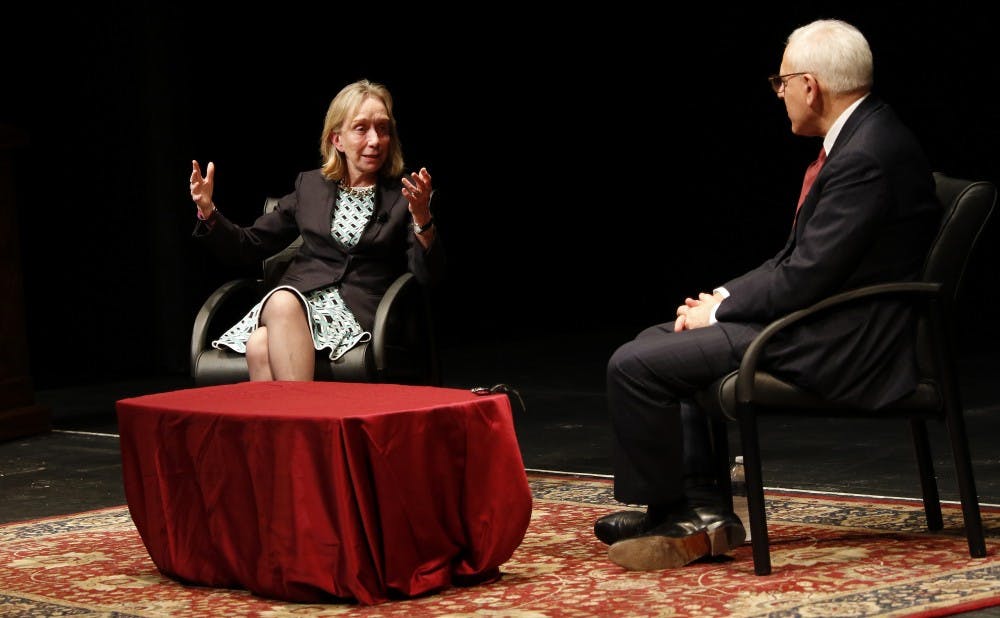Doris Kearns Goodwin took an audience of hundreds on a journey through American presidential history in Reynolds Theater Thursday evening.
Goodwin—a Pulitzer Prize-winning author and presidential historian—was joined in conversation by David Rubenstein, chair of the University's Board of Trustees. The event was one of many programs celebrating the finish of the Rubenstein Rare Book and Manuscript Library renovations, and was part of the biennial Weaver Memorial Lecture series hosted by Duke University Libraries in memory of William Weaver, Trinity '72 and a former member of the Library Advisory Board.
In her question-and-answer session with Rubenstein, Goodwin reflected on her experiences as a presidential historian, beginning with her nomination as a White House Fellow in college. Goodwin’s responses to Rubenstein’s inquiries revealed details about events beyond the historical milestones of Abraham Lincoln, Theodore Roosevelt, Franklin D. Roosevelt and Lyndon B. Johnson’s administrations—particularly about the relationships these men had during their time in politics.
Goodwin explained that it was only after an affair in her marriage to Franklin Roosevelt that Eleanor Roosevelt developed her reputation as one of the most powerful and influential first ladies in American history. First Lady Roosevelt became very active in the feminist movement following her husband's affair, Goodwin said, and traveled nearly 200 days a year to serve as the eyes, ears and voice of her paralyzed husband during the final stretch of his presidential tenure.
Rubenstein also asked Goodwin about her time assisting Johnson during his last year in the White House. Goodwin said he grappled with "paralyzing" emotions that both dissuaded him from seeking re-election and affected his emotions while initially coming into office following John F. Kennedy's assassination.
"'I’m becoming President as a naked man,’” she said, quoting Johnson.
The combination of Kennedy's assassination, the murder of his killer and the unfolding of these events within Johnson’s home state of Texas all took a toll on him, Goodwin explained, and he entered the presidency feeling “empty.”
For Theodore Roosevelt, on the other hand, his time as vice president before ascending to the presidency was the most challenging point of his political career. Goodwin said he was so "bored" with the position that he wanted to go back to law school.
According to Goodwin, Roosevelt’s philosophy was, “There’s nothing more important than using your talents to do your job,” and he believed his talents were better spent in law.
Goodwin's efforts to curate presidential history have led to close collaboration with director Steven Spielberg. Spielberg, who recently purchased the movie rights for her most recent best-seller, "The Bully Pulpit: Theodore Roosevelt, William Howard Taft, and the Golden Age of Journalism", also purchased the rights to her account of President Lincoln, "Team of Rivals: The Political Genius of Abraham Lincoln".
When asked what she most wanted to see in Spielberg's Oscar-winning 2012 film adaptation “Lincoln”, she said she appreciated "that [Spielberg] showed Lincoln as a political genius.”
Goodwin also said of the four presidents she's written about, she would choose Lincoln to have dinner with.
Her first words to him would be, “Mr. Lincoln, tell me a story, because I want to hear you laugh, I want to hear you come alive,” she said.
Several attendees reflected positively on Goodwin’s accounts of the historical figures.
Dolly Madison McKenna, Trinity ’71 and member of the Sanford School of Public Policy's Board of Visitors, said Rubenstein was a phenomenal interviewer and Goodwin was a very engaging storyteller.
John Villa, Trinity '70, and another member of the Board of Visitors, called the event “brilliant.”
“It was a unique insight into the most interesting characters of the 19th and 20th century, from a person who probably knows them better than any living being," he said.
Get The Chronicle straight to your inbox
Signup for our weekly newsletter. Cancel at any time.

